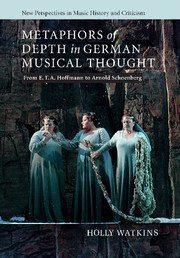Book contents
- Frontmatter
- Contents
- Music examples and figures
- Acknowledgements
- Note on the text
- Introduction
- 1 From the mine to the shrine
- 2 Adolf Bernhard Marx and the inner life of music
- 3 Robert Schumann and poetic depth
- 4 Richard Wagner and the depths of time
- 5 Heinrich Schenker and the apotheosis of musical depth
- 6 Schoenberg’s interior designs
- Notes
- Bibliography
- Index
1 - From the mine to the shrine
the critical origins of musical depth
Published online by Cambridge University Press: 07 September 2011
- Frontmatter
- Contents
- Music examples and figures
- Acknowledgements
- Note on the text
- Introduction
- 1 From the mine to the shrine
- 2 Adolf Bernhard Marx and the inner life of music
- 3 Robert Schumann and poetic depth
- 4 Richard Wagner and the depths of time
- 5 Heinrich Schenker and the apotheosis of musical depth
- 6 Schoenberg’s interior designs
- Notes
- Bibliography
- Index
Summary
The fifth chapter of Novalis’s novel Heinrich von Ofterdingen (1800), a locus classicus of the subterranean, presents a vivid allegory of subjective depth clothed in the garb of a spelunking expedition. Journeying from their home in Eisenach to the town of Augsburg, the young Heinrich and his mother come to a village “at the foot of some pointed hills broken up by deep ravines.” In the taproom of the inn, the guests stumble upon an old miner sharing tales of his apprenticeship. The miner praises his trade’s special connection between spirituality and the exploration of earthly depths. Describing his fellows as “subterranean heroes,” he muses that “in the solemn, quiet company of the primeval rocks inside nature’s dark and marvelous chambers it seemed they were equipped to receive heavenly gifts and to be joyfully elevated above the earth and its difficulties.” Shunning the surface world for the cavernous depths, the miners aspire to a beatific subjectivity transcending the vicissitudes of earthly existence.
Novalis’s praise for the depths does not end with this rather traditional equation of interiority and spirituality. Heinrich’s Bildungsreise, broadly symbolized by the horizontal movement from one town to the next, temporarily takes the form of a vertical descent. After singing a few of his mining songs, the tradesman leads Heinrich and a few others to nearby caves. Once inside, the young man feels as though “the world lay unlocked within him” and that a “hidden tapestry door” has opened onto his inner self. As the party moves more deeply into the cavern, Heinrich senses that “heaven and earth were all of a sudden far away, and these dark, broad halls appeared to belong to a strange subterranean realm.” Despite the old miner’s conviction that the passage into the ground leads to a closer relationship with God, Heinrich’s inward journey moves not toward the divine but deeper within himself. What he discovers there, among the primeval rock formations, are the forces of history and individual creativity, embodied in the figure of an ageless poet-historian living deep in the cavern. Inverting the image of Plato’s cave, in which humans are condemned to see only the shadows of truth, Novalis suggests that truth – especially the truth of the self – lies further within. Crucially, though, this truth remains incomplete. Browsing a miraculous book belonging to the hermit, Heinrich finds illustrations of himself in the clothing of a bygone era. In search of self-knowledge, he races to the manuscript’s conclusion, only to find that the end of the book is missing.
- Type
- Chapter
- Information
- Metaphors of Depth in German Musical ThoughtFrom E. T. A. Hoffmann to Arnold Schoenberg, pp. 22 - 50Publisher: Cambridge University PressPrint publication year: 2011



